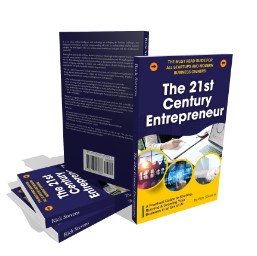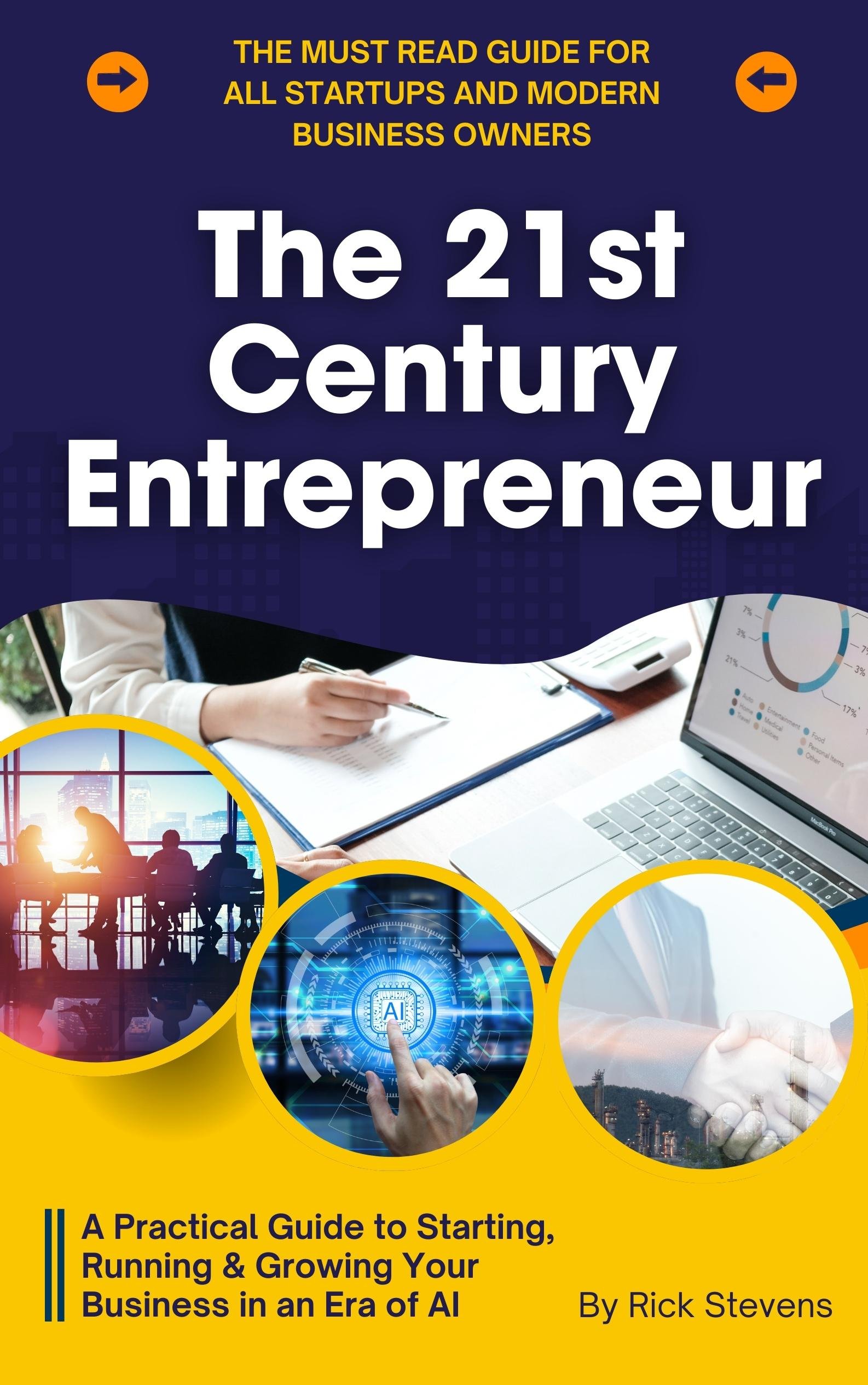Table of Contents
Introduction
In the ever-evolving landscape of business, the role of the entrepreneur has been redefined by the rapid advancements in technology, particularly artificial intelligence (AI) and I felt that whilst there are some amazing resources out there, something was missing from from of the best business books for startups. As someone who has traversed the challenging yet rewarding journey of entrepreneurship, I found myself compelled to write The 21st Century Entrepreneur. This book is not just a personal reflection, but a guide designed to help aspiring business owners navigate the complexities of modern entrepreneurship. In this article, I will delve into my journey, the motivations behind writing the book, and how integrating AI can transform startups for the better.

My Entrepreneurial Journey
Early Inspirations
Every entrepreneur has a story that often begins with a spark of inspiration. For me, it was a combination of childhood experiences and the entrepreneurial spirit evident in my family. Watching my parents run a small business instilled in me a profound respect for hard work and innovation. I was captivated by the idea of creating something from scratch, offering value to others, and making a mark on the world. This early exposure laid the foundation for my journey into entrepreneurship and this is why I feel I was capable of writing one of the most concise best business books for startups that you will ever need.
However, inspiration is just the beginning. My early years were filled with the excitement of brainstorming ideas and dreaming big. I experimented with various ventures, from selling handmade crafts to launching an online platform. Each attempt, regardless of its outcome, taught me invaluable lessons about resilience, market demand, and the importance of understanding customers. These experiences were crucial in shaping my approach to business as I moved forward.
Challenges Faced
No entrepreneurial journey is without its challenges. My path was fraught with obstacles that tested my resolve and adaptability. One significant hurdle was navigating financial constraints. Like many startup founders, I initially struggled with securing funding, which forced me to become resourceful and creative in maximizing limited resources. I learned the importance of budgeting and finding innovative ways to generate revenue through alternative means.
Additionally, the emotional toll of entrepreneurship cannot be understated. The fear of failure often loomed large, leading to moments of self-doubt. It was during these times that I recognized the value of a support network, both personal and professional. Surrounding myself with mentors and fellow entrepreneurs provided encouragement and insight when I needed it the most, reinforcing the idea that collaboration and community are essential in overcoming challenges.
Why I Wrote ‘The 21st Century Entrepreneur’
Identifying a Gap in the Market
As I reflected on my experiences, it became clear to me that many aspiring entrepreneurs struggled with the same challenges I faced and many of even the best business books for startups fail to target the latest advances in technology that we should all be embracing. I noticed a gap in the market for a comprehensive resource that addressed the unique hurdles of modern entrepreneurship, especially in the context of rapid technological change. This observation prompted me to put pen to paper and share my insights through The 21st Century Entrepreneur.
The book, which is not only for startups but for any business looking to grow, or bring themselves up to sate is designed to be one of the best business books for all and aims to bridge the knowledge gap by providing practical advice, strategies, and real-world examples that resonate with today’s business landscape. By focusing on innovation, adaptability, and the integration of technology, I hoped to empower a new generation of entrepreneurs to navigate the complexities of their journeys with confidence and clarity.
Sharing Personal Experiences
In writing The 21st Century Entrepreneur, I made it a priority to share my personal experiences candidly. I believe that authenticity plays a crucial role in connecting with readers. By recounting my successes and failures, I aimed to create a relatable narrative that would inspire others to embrace their unique paths.
Furthermore, I included practical exercises and reflections throughout the book, encouraging readers to engage actively with the material. My goal was not only to inform but also to motivate aspiring entrepreneurs to take actionable steps toward realizing their visions. The combination of storytelling and practical guidance is intended to foster both understanding and inspiration.
Contributing to the Best Business Books for Startups
As I embarked on this writing journey, it became evident that The 21st Century Entrepreneur could serve as a valuable addition to the canon of business literature, especially for startups. By synthesizing my experiences with the latest trends in entrepreneurship, I hoped to provide readers with a holistic view of what it takes to succeed in today’s market. I aimed to offer insights that not only resonate with established entrepreneurs but also empower newcomers who are just starting to explore the possibilities of entrepreneurship.
Additionally, I wanted to ensure the book covers diverse perspectives, incorporating stories of successful entrepreneurs across various industries. This variety enriches the narrative and demonstrates that while the paths may differ, the principles of determination, creativity, and adaptability remain universal in the landscape of entrepreneurship. So if this book makes your list of best business books for startups, let me know. If not, also let me know as I would love to hear your feedback and also feedback about why other books by other authors may or may not cut it because I am always looking to improve and think of new ideas for new, innovative subjects to build my library of best business books for startups and businesses at all levels and stages of their journey.
The Role of AI in Modern Entrepreneurship
Understanding AI and Its Applications and why this makes the 21st Century Entrepreneur different from many business books for startups.
Artificial intelligence is reshaping the entrepreneurial landscape in profound ways. Understanding AI and its applications is crucial for modern business owners. AI can analyse vast amounts of data, automate repetitive tasks, and provide insights that were previously unattainable. From chatbots that enhance customer service to predictive analytics that guide decision-making, the applications of AI are diverse and transformative.
Business owners must recognize that AI is not merely a trend, but an integral component of a successful strategy in today’s digital age. By leveraging AI technologies, entrepreneurs can enhance efficiency, reduce costs, and gain a competitive edge. Embracing AI opens avenues for innovation that can lead to the development of new products, services, and business models, ultimately driving growth and sustainability. To write the best business book for those starting a business, I knew that we have to include some of the very basics of AI because it plays a critical role in competing no matter what sector you are in.
AI Tools for Startups
There is a wide array of AI tools available today designed specifically to support startups in various capacities. For instance, platforms like Salesforce Einstein provide AI-driven insights for customer relationship management, allowing businesses to better understand and engage with their customers. Similarly, tools like HubSpot utilize AI to optimize marketing campaigns, enabling startups to reach their target audience more effectively.
Additionally, AI-driven project management tools such as Monday.com or Trello help teams streamline workflows and enhance collaboration. By automating task assignments and deadlines, these platforms free up valuable time for entrepreneurs to focus on strategic initiatives. The myriad of tools available empowers startups to harness AI’s potential, improving overall productivity and effectiveness.
Case Studies: Successful AI Integration
Numerous startups have successfully integrated AI into their operations, serving as inspiration for others looking to do the same. For example, ZestFinance leverages AI to analyze credit risk and provide loans to individuals with limited credit histories. This innovative approach not only expands access to credit but also showcases the power of AI in transforming traditional industries.
Another notable example is Slack, which uses AI to enhance its communication platform. Through natural language processing, Slack can offer users personalized recommendations and streamline workflows. These case studies exemplify how startups can leverage AI to create unique value propositions and drive growth in competitive markets.
Transforming Your Startup with AI
Practical Steps to Implement AI
Implementing AI in your startup doesn’t have to be an overwhelming task. Start by identifying specific areas within your operations that could benefit from AI integration. This could be anything from automating customer service responses to utilizing AI analytics for market research. Once you’ve pinpointed these areas, research the AI tools that align with your needs and budget.
Next, consider starting small. Implementing AI gradually allows you to gauge its effectiveness and make necessary adjustments without a significant upfront investment. Additionally, encourage a culture of experimentation within your team, as this fosters creativity and innovation. As you gather data and insights, continuously evaluate and adjust your strategy to maximize the benefits of AI integration.
Common Misconceptions about AI
Despite the growing buzz around AI, several misconceptions can hinder its adoption among startups. One common myth is that AI is only relevant for large corporations with extensive resources. In reality, numerous affordable AI tools are tailored for small businesses, making it accessible for startups of all sizes.
Another misconception is that AI will replace human jobs. While AI can automate certain tasks, it is meant to augment human capabilities, not replace them. By embracing AI, entrepreneurs can free up time for their teams to focus on more strategic, creative tasks that require human insight and emotional intelligence. Understanding these misconceptions is vital to fostering a positive attitude toward AI integration. This is the heart and soul of the business book The 21st Century Entrepreneur which I wrote to clarify these matters.
Future Trends to Watch
The future of entrepreneurship will undoubtedly be shaped by further advancements in AI technology. As machine learning algorithms become more sophisticated, startups will be able to leverage predictive analytics to anticipate market trends and consumer behaviour. This capability will enable entrepreneurs to make data-driven decisions with greater accuracy, minimizing risks and maximizing opportunities.
Moreover, the rise of AI-driven personalization will transform customer experiences. Businesses that harness AI to tailor their offerings based on individual preferences will gain a competitive edge. As consumers increasingly expect personalized interactions, startups that prioritize AI-driven strategies will likely thrive in the coming years.
Conclusion
As I reflect on my journey and the lessons learned along the way, I am more convinced than ever that entrepreneurship is a dynamic and transformative path. The challenges I faced only strengthened my resolve and commitment to helping others navigate their own journeys. The 21st Century Entrepreneur serves as both a reflection of my experiences and a beacon of guidance for those looking to embark on their entrepreneurial ventures.
AI stands as a powerful ally in this journey, offering tools and insights that can redefine how we do business. By embracing technology and staying adaptable, entrepreneurs can position themselves for success in an ever-changing landscape. The future is rife with opportunities for those willing to innovate and evolve.
FAQs
What inspired you to write ‘The 21st Century Entrepreneur’?
My experiences as an entrepreneur, coupled with the desire to share valuable insights and lessons learned throughout my journey, inspired me to write this book. I aimed to bridge the knowledge gap for aspiring entrepreneurs and provide practical guidance on navigating the complexities of modern business. I wanted to create a book that´s easy to read, not too long and that anyone who is thinking of starting or looking to grow their business really can value as one of the best business books for startups and growing businesses. You, the reader will decide the verdict!
How can AI benefit my startup?
AI can enhance your startup by automating repetitive tasks, providing data-driven insights, and improving customer experiences. It allows entrepreneurs to operate more efficiently and make informed decisions based on real-time data analysis.
What are some affordable AI tools for startups?
Some affordable AI tools for startups include Salesforce Einstein for CRM, HubSpot for marketing automation, and Trello for project management. These platforms are designed to be user-friendly and accessible for businesses of all sizes.
Is AI only for tech startups?
No, AI is applicable across various industries, not just tech. Even non-tech startups can leverage AI for marketing, customer service, and operational efficiency.
What common misconceptions exist about AI?
Common misconceptions about AI include the belief that it is only for large corporations and that it will replace human jobs. In reality, AI is accessible for startups, and it is designed to augment human capabilities rather than replace them.
You can buy The 21st Century Entrepreneur on Amazon here.





